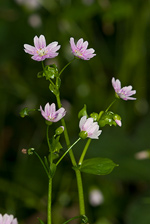|
||||||
|
CLAYTONIA. Springbeauty, Pink Purslane. [Portulacaceae] |
|
|
Three species of Claytonia are recorded in Britain. Only one British miner recorded on Claytonia. A key to the European miners recorded on Claytonia is provided in Bladmineerders van Europa. |
 Pink Purslane Claytonia sibirica |
|
Key for the identification of the known mines of British |
1 > Leaf-miner: In the first instar the larva mines the leaves, forming short, irregular, blotch-like mines, but in later instars it lives externally, feeding in spun leaves and often twisting those of tender shoots. Larval head light-brown or yellowish brown, edged with black postero-laterally, ocellar area blackish; prothoracic plate black edged with whitish anteriorly; abdomen dull dark green; pinacula distinct, black, sometimes brownish but with black bases to setae; anal plate large, black (Bradley et al., 1973). Small, full depth mine without a definite shape; little frass. Some silk is deposited in the mine. The larva soon leaves the mine and continues feeding among spun leaves. |
|
Cnephasia incertana (Treitschke, 1835) [Lepidoptera: Tortricidae]. |
| Last updated 02-Jul-2019 Brian Pitkin | ||
